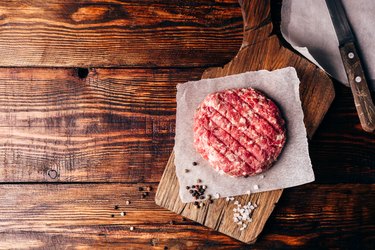
Juicy grilled hamburgers are staples of American cookery, but the deceptively simple burger all too often ends up with the consistency of a hockey puck. Dry, shriveled burgers can ruin any picnic or family gathering, but a few simple tips — such as the burger dimple — can help.
You probably aren't going to be disappointed by a burger that's too juicy, but dry meat is a different story. Generally, burgers shrink on the grill when they are made from very lean meat cooked on high heat for too long. Choose ground beef that contains some fat, or bulk up leaner meats with a mixture of milk and bread.
Video of the Day
Video of the Day
Include Some Fat
Step 1: Choose Your Meat
Purchase pre-ground, 20 percent fat, 1 pound chuck-meat packages. Chuck meat provides optimal flavor for grilling. According to the USDA, 4 ounces of this meat includes 11 grams of total fat.
Step 2: Prep the Grill
Prepare the charcoal grill, light the coals and wait until they have a coating of ash. Oil your grill grate and place it directly over the heat.
Step 3: Divide and Dimple
Divide the 1 pound packages of ground meat into four. Gently shape the ground meat into a sphere and pat it into a flattened disk.
Form a patty that is no thicker than 1 inch and that is slightly larger than the diameter of the hamburger buns you want to use. Salt and pepper the patties on both sides. Skip the salt if you're watching your sodium intake. According to the American Heart Association, healthy adults should consume no more than 2,300 milligrams of sodium per day.
Place a small indentation — a burger dimple — in the middle of each patty to help maintain its shape while grilling.
Step 4: Cook Your Burgers
Place the burgers directly over the hot coals. Let the burgers cook for four minutes. Do not flatten or poke them. Flip the burgers over using a long-handled spatula and cook them for an additional four to five minutes for a medium to medium-well-done burger.
Check the internal temperature of the burgers. According to the USDA, the minimum safe temperature for consumption of ground beef is 160 degrees Fahrenheit.
Immediately remove the burgers from the grill onto a platter and cover them with aluminum foil. Allow them to stand for 1 to 2 minutes to finish cooking.
Fortify Lean Meat
Step 1: Make a Panade
Remove the crusts from, and tear up, two slices of white bread. Add enough milk to cover the pieces. Put the bread-and-milk mixture in the refrigerator until the bread absorbs the liquid and turns soft.
Remove the mixture from the refrigerator and squeeze it out, discarding any excess liquid, and then mash it with a fork until it forms a paste.
The paste is a panade, which serves as a fat substitute when you cook with lean ground beef.
Step 2: Mix It Up
Mix the milk-and-bread panade, ground beef and some salt and pepper. Form patties that are about 1 inch thick and slightly larger than the buns or bread they will top.
Step 3: Grill Your Burgers
Prepare your grill, and when the coals ash over, place the formed burgers directly over the heat. Cook the burgers on one side for five minutes and then flip them over, cooking for another five minutes or until they are fully cooked through.
You can cook the burgers well-done when using the panade, as it keeps them moist and prevents them from shrinking.
Things You'll Need
Charcoal
Grill
Long-handled spatula
Salt
Pepper
Tip
Add ground veggies such as zucchini or carrots to the meat, or add cooked lentils or mushrooms for an alternative take on standard fare. These burgers will take longer to cook.
Warning
Avoid potential contamination from raw meat; use separate tools for raw and cooked meat and wash your hands thoroughly after handling any raw animal products.
Was this article helpful?
150 Characters Max
0/150
Thank you for sharing!
Thank you for your feedback!